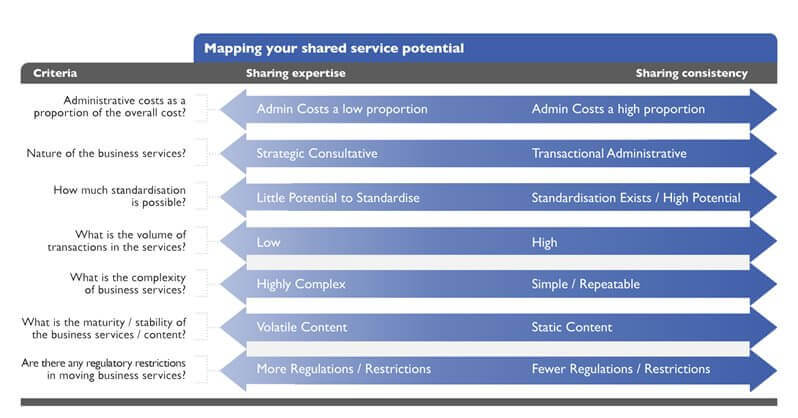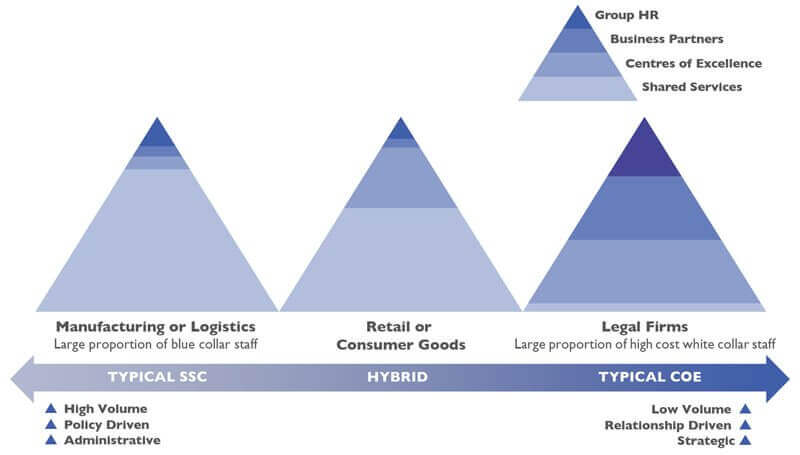The idea of sharing services across business units has been around for quite some time. But it’s fair to say that the focus so far has been primarily on sharing back office functions to improve consistency and drive down costs.
However, if you look in greater, fresher detail at the true nature and potential of what sharing services really involves, it can also be a big value generator for your business.
Why shared services?
Companies have tended to turn to shared services for a number of tried and tested reasons. By reducing headcount and gaining economies of scale across pooled back office services, such as HR, finance and IT, you can lower operating costs and increase efficiency. You can also drive continuous improvement and enhanced sharing of best practice by standardising and aligning services. And you can focus more energy and resources on sales, marketing, innovation and other aspects of the core front office, the traditional home of added value. Looked at this way, shared services are essentially about reducing costs and getting greater consistency, with a promise of more scope to concentrate on the core.
But what if back office efficiency was only part of the story? What if value generation was much more at the heart of sharing services?
A deeper, broader view
Look at any area you are considering sharing, say for example HR. When you actually unpack what goes into the performance of that area, it typically covers a range across two ends of the sharing spectrum.

Centres of consistency
At one end, you have the familiar sharing of transactional services. These are relatively low value, high volume, administrative, repetitive tasks that you want to standardise for consistently optimum performance. What you’re after here is, above all, super efficiency.
Centres of expertise
At the other end, there is a very different flavour of sharing. This is all about pooling expertise – the experience and specialist know-how of the relatively few people who really understand an area. The emphasis here is on making better use of a high value, scarce, strategic resource. The key point is that these two are both types of sharing – very different and distinct types that need addressing in different ways in order to generate the greatest value.
Identifying the full opportunity
So the first task is to map carefully and accurately your full sharing potential across this spectrum of consistency and expertise. You need a really detailed and accurate map, rather than a general outline. This is a complex task, not least because inevitably there are interestingly knotty grey areas in between the two extremes, where elements overlap and intermingle.
But it is well worth the effort
Companies that set out on their shared services journey without this map are in danger of running into difficulties because the solution they try to adopt does not fit their business well enough. Moreover, they are also at risk of missing an important value generating opportunity by not implementing a solution that covers the full sharing spectrum.
Getting the balance right
The balance between sharing consistency and expertise will depend on the nature of your business.

An example of how the map for HR sharing might vary by industry sector.
Structuring your sharing
Armed with a clear picture of your sharing landscape you can look to structure the right mix of service. This should be highly tailored to your particular business, situation and ambitions.
At the transactional end of the spectrum, there are four key considerations: whether to have specialised mono-functional shared services or global multifunctional shared services; what kind of hub approach to take, for example how many global or regional hubs; whether to keep the shared service in-house or outsource it; and where to locate the shared services, principally onshore or offshore.
The key considerations for sharing expertise are inevitably very different. They include judging where best to locate the expertise so it stays close to other parts of the business and how best to link experts around the world, often via a virtual network rather than physically locating the experts all in one place.
Realising your full sharing potential
Looking at the evolution of shared services, there are certain functions that have led the way, notably IT, HR and finance. And there are certain sectors where shared services have been taken up in a big way, such as manufacturing, telecoms and consumer goods.
This fits with the traditional high volume low value view of sharing, but take a closer look through the lens of our map and there are certainly opportunities beyond the back office and in other sectors where shared services have historically had less take-up, such as media – a sector where companies are often run as a highly-decentralised group of autonomous businesses. Indeed, we are working with a number of media clients to help them explore and maximise the full potential of sharing across their fast moving, highly complex, increasingly digital, people and intangible asset-heavy businesses.
Exploring multifunctional sharing
Another key area of opportunity lies with organisations that have already adopted shared services for several functions. They may find more value from taking the next step towards multifunctional shared services. This can not only unlock greater economies of scale, but also drive value by building a centre of expertise for shared services itself.

Planning the right first step
For those, by contrast, with little or no shared services already, a key question may be whether to start function-specific, or try to jump directly to a multifunctional approach. This needs careful consideration to strike the right balance between optimising value in the long term and not biting off more than can be chewed in the short term. In particular you need to keep a watchful eye not just on the processes and technology but also on the people and change aspects – these softer areas are often the toughest to manage successfully when moving to sharing services.
A smart move
To sum up, every organisation can potentially gain from sharing services – not just by saving money but also generating value. That’s not to say that all organisations should always go down the sharing route. After mapping the risks and rewards for one of our clients for example, we advised them against. But it’s a smart move for everyone to investigate and identify the opportunity properly. If you’d like to explore what this means for you, we’d be very happy to help.











